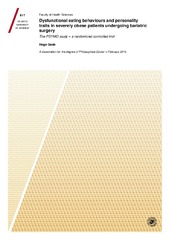Dysfunctional eating behaviours and personality traits in severely obese patients undergoing bariatric surgery
Permanent lenke
https://hdl.handle.net/10037/8217Åpne
Thesis introduction and appendix (PDF)
Psychological correlates to dysfunctional eating patterns among morbidly obese patients accepted for bariatric surgery. Hege Gade, Jan Harald Rosenvinge, Jøran Hjelmesæth, Oddgeir Friborg. Published in Obesity Facts 2014;7:111–119. (PDF)
Effectiveness of a cognitive behavioral therapy for dysfunctional eating among patients admitted for bariatric surgery: a randomized controlled trial. Hege Gade, Jøran Hjelmesæth, Jan H. Rosenvinge, Oddgeir Friborg. Also available in Journal of Obesity, vol. 2014, article ID 127936 (PDF)
The impact of a pre-surgical cognitive behavioral therapy (CBT) on dysfunctional eating behaviours, affective symptoms and body weight one year after bariatric surgery. A randomised controlled trial. Hege Gade, Oddgeir Friborg, Jan H. Rosenvinge, Milada Cvancarova Småstuen, Jøran Hjelmesæth. (Manuscript). Published version, with altered title, available in Obesity Surgery, Nov. 2015, vol. 25 (PDF)
Thesis entire (PDF)
Dato
2015-05-21Type
Doctoral thesisDoktorgradsavhandling
Forfatter
Gade, HegeSammendrag
The PSYMO study is a randomised controlled trial including 102 severely obese patients undergoing bariatric surgery. Firstly, we examined the relationships between dysfunctional eating behaviours (DE), personality, anxiety and depression. Secondly, we examined whether a pre-surgical cognitive behavioural therapy (CBT) intervention exceeds usual care in the improvements of dysfunctional eating behaviours, mood, affective symptoms and body weight both before- and one year after bariatric surgery.
The main findings from this study were:
• The personality traits neuroticism and conscientiousness were more strongly related to DE than symptoms of mood and anxiety. Anxiety and depression were weakly related to DE when personality traits were controlled for. An additional finding was that neuroticism partially mediated this relationship, thus indicating a putative mechanism. Moreover, EE occurred more often in female patients.
• The patients in the intervention group improved their DE significantly, thus supporting the potential benefit of using CBT intervention for this group. Patients were less inclined to eat for emotional reasons and to lose control of their eating following the intervention, as well as a better ability to regulate or stop eating when satisfied. A supplementary benefit was a reduction in the symptoms of anxiety and depression. Finally, a small, yet statistically significant reduction in BMI was found.
• One year after BS, the two groups were indistinguishable in terms of weight loss, and both groups had comparable improvements in DE and symptoms of anxiety and depression. However, the onset of improvement in the CBTgroup was earlier in all DE, affective and mood symptoms.
Forlag
UiT The Arctic University of NorwayUiT Norges arktiske universitet
Metadata
Vis full innførselSamlinger
Copyright 2015 The Author(s)
Følgende lisensfil er knyttet til denne innførselen:


 English
English norsk
norsk
